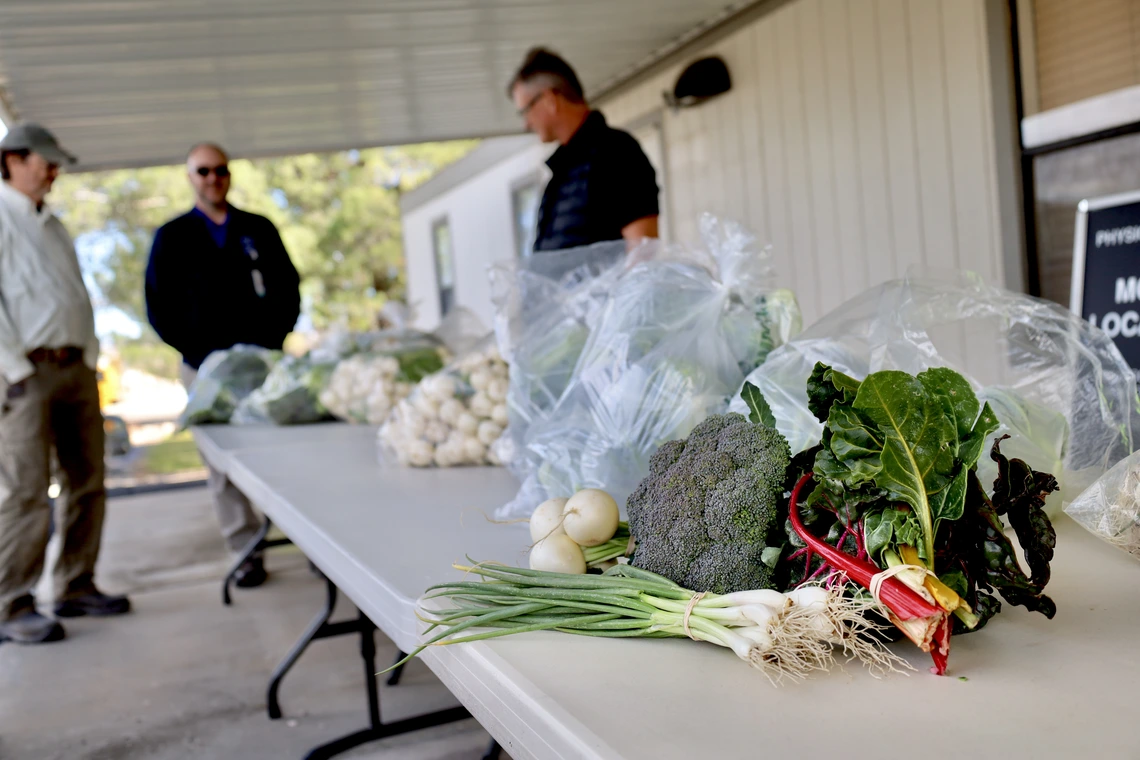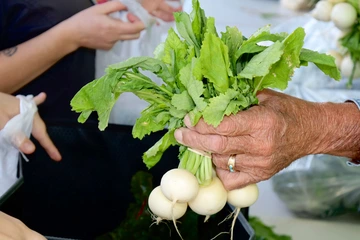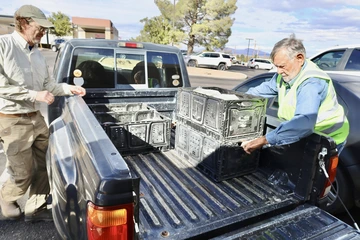Extension Turning Small Connections into Big Community Wins in Cochise County
Cochise Building Healthy Communities' countywide collaborations have increased veggie availability and reduced food insecurity.

Extension volunteers hand out vegetables weekly at Benson Community Hospital, thanks to Cochise Building Healthy Communities, a Cooperative extension program.
Brad Poole, Cooperative Extension
Along one remote stretch of rural highway in Cochise County, Dollar General is the only place to buy groceries.
Though the small store has prepared foods and staples like bread, milk and eggs, until recently they didn’t sell fresh vegetables. That was a problem for residents who don’t have transportation to get to a more distant grocery store.
So University of Arizona Cooperative Extension stepped in via Cochise Building Healthy Communities, a program aiming to spur measurable changes and shift cultural expectations around health. The BHC staff reached out to Dollar General and asked them to start selling produce in the remote location.
“Now at Dollar General – and I don't know if they're doing anywhere else – you can get onions, potatoes, carrots. It’s amazing that this just basically came from a phone call,” said Extension Family and Consumer Health Sciences Area Agent Evelyn Whitmer, who coordinates BHC work.
The program was originally funded by the Legacy Foundation of Southern Arizona and is now funded by a Hispanic-Serving Institutions grant from the National Institute of Food and Agriculture. In the three years after BHC started in 2018, the food picture changed countywide. An analysis by the UArizona Community Research, Evaluation, and Development team and Extension Associate Director, FCHS Michelle Walsh showed 42 percent more fruits and vegetables were available, and food insecurity dipped 2 percent, Whitmer said.

Cochise Building Healthy Communities keeps local vegetables in local hands.
Brad Poole, Cooperative Extension
“I think the county working together has been super impactful, especially around food access,” she said. “Even with Covid, we decreased the food insecurity by 2 percent, which is huge.”
The Dollar General episode is just one way the program helps Cochise County stay healthier. They worked with SNAP-Ed to place hydration stations around the county, supported school gardens with equipment and education, fostered a partnership with the Diaper Bank of Southern Arizona to give out more than 20,000 diapers, and connected food pantries with each other and community gardens.
The last accomplishment also highlights the value of simple communication. After BHC coordinated a meeting among county food pantries, the groups realized they could be more effective working together, Whitmer said.
“Somebody said, ‘I have a problem because I don't have an extra freezer, and you know what? Willcox has an extra freezer.’ Then somebody said, ‘I don't have a way to transport this,’ and someone else said, ‘I have a half-empty truck. Why don't I pick up your stuff?’” she said. “Just getting people in a room to start talking makes a big difference.”
Communication also helped spur a collaboration that helps keep locally grown food local.
Joseph (Sepp) Sprietsma, the former BHC School Liaison who is now an Extension volunteer, had been talking to local farmers about keeping their food in the community. Most southern Arizona small-scale farmers sell their produce and eggs at Tucson farmer’s markets, where they can get better prices. So Sprietsma connected with Purchase Local AZ, a program of Pinnacle Prevention, a food security non-profit. The connections are helping SouthWinds Farm, a Benson organic producer, distribute food to schools and staff at Benson Community Hospital.
Pinnacle pays SouthWinds, while volunteers do the legwork – manning tables and making sure the vegetables are distributed. On a recent breezy day, a few hospital staff members filed past a table holding plastic bags of Swiss chard, collard greens, broccoli, and white radishes. Joe Marlow, an economist by training who opened SouthWinds in 2012, likes the PLAZ program, because it’s an easy drive and helps the community, he said after his pickup was unloaded at the hospital.

Brad Poole, Cooperative Extension
“If I could do my entire market business here in Benson, I would. I’d just as soon not drive to Tucson,” Marlow said.
Extension’s Cochise Leadership Academy, developed to train community members to identify needs and find solutions through partnerships, is a pillar of BHC. Scores of Cochise County residents have graduated, bringing diverse perspectives to bear against problems in the community.
Academy graduates become mentors for future graduates.
Benson Community Hospital Community Health Manager Jason Zibart, a Cochise County Cooperative Extension advisory board member, leadership academy graduate and 2024 Arizona Extensionist of the Year, is an example. He helped make the diaper connection and coordinates the hospital produce distribution.
Extension and BHC are valuable community assets, Zibart said.
“They’re just a really good partner. It’s good knowing that they’re out there and that if you have a question or you need some sort of resources, that you have extra help, people who might be able to look into things for you,” he said.
Another small change with big impact came in an unexpected place – bus schedules, Whitmer said.
In discussions with social program staff, BHC staff found that although there were buses running, the times didn’t match needs. People needed early morning and evening buses to get to and from work, so they connected with municipal governments and asked for changes. Now the bus schedules match riders’ needs.
“And it was because we just kind of got everybody talking together and saying, ‘These are some of the issues we have in our community, and how do we solve them?’ It's basically getting people together to systematically work toward solving their own problems,” Whitmer said.
In coming months, BHC plans focus on the Pinnacle Prevention program to keep more food local, a program Whitmer thinks is underused. Building Healthy Communities can help farmers, she said.
“We’ll help you write the grant so that you can keep food local, and we'll get food from farmers, and then figure out how to get it distributed. We have a bunch of people that are excited about keeping food local.”

